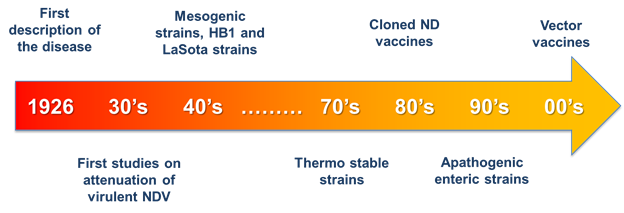Biosecurity is the unavoidable component of the prevention of any transmissible infectious disease. It can be defined as a comprehensive range of clear regulations, measures and procedures aiming at minimizing the possibility of introduction of undesirable pathogens inside a defined compartment.
Vaccination against ND was one of the first vaccinations introduced in the poultry industry. It has relied on vaccines, vaccination programs and administration techniques that obviously demonstrated benefits but showed drawbacks as well as limitations and have remained practically unchanged for more than half of a century.
It is important to understand this situation in order to better evaluate the importance of the innovations that are occurring today and the perspectives they are opening.
Since the initial outbreaks of ND reported in Java Island (Indonesia) as well as in Newcastle upon Tyne (England) in 1926, a tremendous amount of scientific investigations on the prevention and control of the disease by vaccination as well as on the development of effective vaccines has been carried out.
From the first attempts to produce an inactivated vaccine in the early 1930s to the development of genetically engineered vaccines nowadays, different types of vaccines have been developed and made available to producers, including:
- Inactivated vaccines.
- Live attenuated vaccines.
- Based on mesogenic NDV strains.
- Based on lentogenic pneumotropic NDV strains.
- Based on cloned lentogenic pneumotropic NDV strains.
- Based on asymptomatic enteric NDV strains.
- Immune complex vaccines.
- Antigenically matching vaccines.
- Recombinant vector vaccines.

Objectives of vaccination
Initially, vaccination against ND aimed at preventing (or reducing) direct losses attributable to the disease such as morbidity, mortality, drop in egg production, reduction of productive performances and others. The objective was clearly toward protection.
Later on, the poultry industry started to ask not only for efficacious vaccines but also for products safe enough to avoid the negative impact of post-vaccination reactions on birds’ performance. However, the main objective was still focused on protection.
In the recent past, at the same time the poultry industry was evolving, there have been remarkable changes in farming conditions. Companies have invested heavily to build large production facilities with housing systems that allow increased stocking densities. Not surprisingly, larger production complexes have resulted in an increased population density in most producing areas. The risk of diseases challenge increases considerably in such circumstances and the eventual losses due to a Newcastle disease outbreak augment dramatically.
In this new context, one of the most important requirements for vaccination progressively became to be able to reduce significantly the re-excretion of the NDV in case of challenge. In this way, the amount of NDV that would reach the neighboring flocks and/or farms would be reduced and the losses diminished. The risk of getting hit by the disease would be lowered.
Today, the objective of prevention has been added to the request for protection and the request has induced an evolution toward a more comprehensive objective for vaccination: helping in controlling Newcastle disease.
Vaccination against ND using classical vaccines (live and inactivated vaccines)
In real life, vaccination against ND (as well as against any other disease) includes the following parts:
- The vaccine(s)
- The vaccination scheme
- The route and quality of administration(s)
- The monitoring of vaccination
Any vaccination program as designed for any farm or any poultry organization is a combination of the selections, decisions and implementations made regarding each one of these different parts.
Its overall value depends on its relevance considering at least the epidemiological situation, the level of passive immunity present in the day-old chicks, the presence of other pathogens (with special regards to Mycoplasma gallisepticum and Escherichia coli that can complicate post vaccination reaction) and the quality of its application. This is to say that there is no perfect and universal vaccination program. In the field, a vaccination program against ND is always a compromise, and it is important to understand why.
Under experimental conditions, very high level of protection can be obtained against challenge with all classical ND vaccines, as long as they are properly produced, controlled and applied at full dose.
However, under field conditions, this is not a sufficient condition to reach the desired level of protection. This is because there is no classical ND vaccine that is at the same time:
- Very immunogenic
- Very safe
- Capable to overcome MDANDV present in the day-old chicks
- Easy to apply
- Applicable in the hatchery (and particularly in-ovo) which is the best option to ensure a good vaccine application
- Capable of inducing a long lasting immunity
For these reasons, except in countries free of ND, a ND vaccination program includes different interventions at different ages, with different vaccines, administered according to different routes and methods, with variations in the quality and reliability of the administration depending on the people in charge, and with implementation of various monitoring systems. Each time, the designed program is a compromise.


